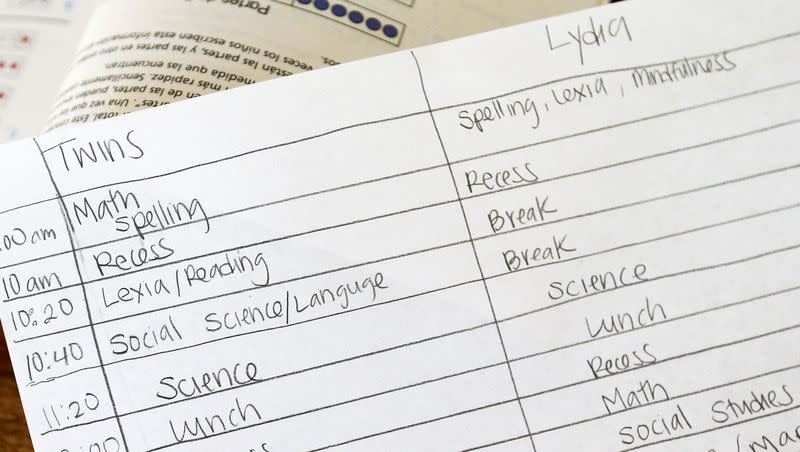Home-schooling has become less religious, and other takeaways from new research

This article was first published in the State of Faith newsletter. Sign up to receive the newsletter in your inbox each Monday night.
In popular culture, home-schooling has long gotten a bad rap. It’s been associated with political and religious extremism, as well as awkward, sheltered adults.
If you were home-schooled or you have friends who were, you’ve probably always thought those stereotypes were unfair. But now, there’s research to justify your frustration, which shows that the home-schooling community is more diverse and well-adjusted than it’s typically presented to be.
A new Washington Post-Schar School poll found that the home-schooling community of today is comprised of families with a wide range of political, religious and education-related beliefs.
Yes, some do avoid public schools because the schools seem too liberal or anti-religious, but others choose home-schooling because they want to keep their kids safe from bullying or provide a more tailored academic routine. For other home-schooling families, the answer as to why they stay home is “all of the above.”
In its story on this new data, The Washington Post concluded that home-schooling is increasingly seen as an educational tool rather than a subversive movement. It now carries less of a stigma among liberals, as well as among people who don’t regularly attend church.
Home-schooling is “no longer driven by shared ideology and political goals but by circumstances specific to individual families,” the Post reported.
Another recent study into home-schooled children of nurses highlighted some of the positive traits of home-schoolers that don’t get talked about enough. Researchers found that formerly home-schooled young adults are more likely to volunteer and otherwise engage with their communities than other young adults.
“Home-schooled children generally develop into well-adjusted, responsible and socially engaged adults,” the researchers noted for The Wall Street Journal.
Here are some more interesting takeaways from all this recent research:
The Washington Post-Schar School poll found that concern about school shootings and concern about bullying are the fourth- and fifth-most common reasons why families choose home-schooling today.
The ability to provide in-home religious instruction ranked eighth on the survey’s list of common reasons to home-school. Around one-third of parents currently home-schooling said they chose it for this faith-based reason. As recently as 2012, nearly two-thirds of home-schooling parents said the same, according to The Washington Post.
Another new survey on home-schooling from the Foundation for Individual Rights and Expression found that around half of formerly home-schooled kids who are now in college identify as either “Protestant” or “just Christian.”
In his blog post on the foundation’s survey, political scientist Ryan Burge pointed out that while formerly home-schooled kids are more likely than other college students to identify as Republican, a not insignificant share of home-schoolers identify as “strong Democrats.” “Sixteen percent of homeschooled kids ID as strong Republicans. Thirteen percent ID as strong Democrats,” Burge noted.
These are the top 10 most common college majors among formerly home-schooled students, according to the survey from the Foundation for Individual Rights and Expression: engineering, biology, agriculture/food science, other, psychology, business, computer science, animal science, African American studies, accounting. Burge noted that most of these are also on the top 10 list for college students who weren’t home-schooled. The most notable exception to that overlap was African American studies.
Fresh off the press
Religion cases are notably absent from the Supreme Court’s fall schedule. Is that a good thing?
New questions on LGBTQ identity could be coming to one of the Census Bureau’s main surveys
Auburn coaches led prayers and performed baptisms. Religious freedom conflict followed
Term of the week: Office of Armed Forces and Federal Ministries
Forgive me for choosing such a long term this week. I discovered the Episcopal Church’s Office of Armed Forces and Federal Ministries last week and wanted to share what I learned.
The office, which was formed in the 1960s, supports Episcopalian chaplains working in the military context, whether alongside combatants, in Veterans Affairs hospitals or in prisons. There are currently around 115 people serving in such roles, according to a recent press release from The Episcopal Church.
What’s most interesting to me is the fact that the office has its own bishop. The Rev. Ann Ritonia, who previously served in the Marine Corps and as a church rector, was consecrated into the role of bishop suffragan for Episcopal Armed Forces and Federal Ministries over the weekend. Her job is to oversee current chaplains’ work and help recruit new ones.
What I’m reading ...
Speaking of chaplains, a growing group of these faith leaders are apparently in favor of using psychedelic drugs like “magic mushrooms” to help people in pain. As NPR recently reported: “Religion has long offered a context, a language, for engaging with things in this world that are beyond everyday comprehension. Things we can’t see the beginning or end of. How to live, and forgive, and make meaning. And with psychedelics, chaplains are hoping to bring their experience with these old questions into a new conversation.”
The Washington Post spoke with several former senators about why many of their (often older) former colleagues refuse to retire. The resulting article is both interesting and delightful. I wish I could write in such a charming way.
Alissa Wilkinson at Vox recently previewed two new documentaries about Christian missionary work. I’ve added both of them to my to-watch list.
Odds and ends
My friend Kate Shellnutt, an editor for Christianity Today, recently highlighted a fun story about one congressman’s religious tattoo.
I can’t believe it’s already October! I hope you and your family take time this month to watch the leaves change colors, carve pumpkins and indulge in apple cider donuts.

